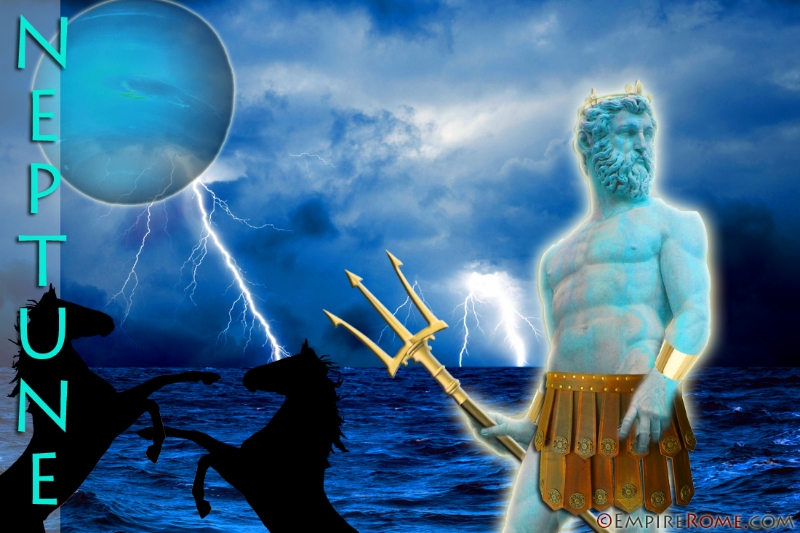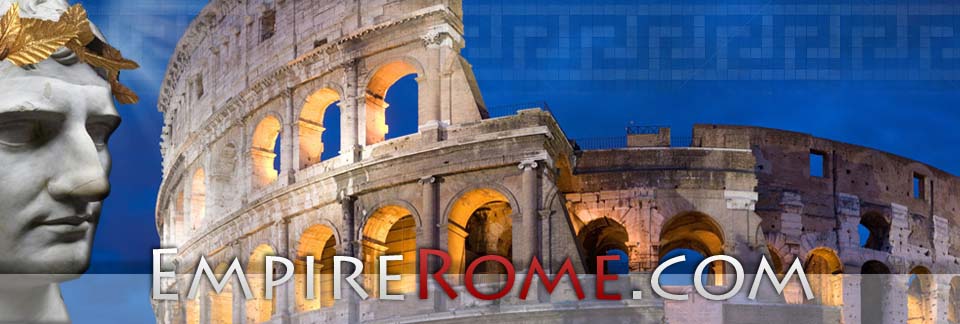
| NEPTUNE “God of the Sea” | |
| God of: | God of the Sea, Water, and Horses |
| Type: | Major |
| Roman Name: | Neptune |
| Greek Name: | Poseidon |
| Other Names: | Neptune Equestris |
| Festivals: | Neptunalia, July 23 |
| Shrine/Temple: | Basilica Neptuni at Campus Martius |
Overview
Neptune is the Ancient Roman god of the sea and water. In Ancient Rome, Neptune was known as the powerful and tempered sea god who could destroy sea villages at a moment’s notice. Neptune controlled not only the sea, but also bodies of fresh water. With his powerful trident, Neptune would create monstrous storms, earthquakes, and floods that would make men quiver.
Neptune’s father was Saturn the god of time. Neptune’s brothers were Jupiter, king of the gods, and Pluto the god of the dead. Neptune’s wife was Queen Salacia, goddess of salt water.
Neptune is believed to come from the Etruscan and Italic cultures.
Duties, Attributes, and Symbols
Neptune’s godly symbol is a trident, or spear which he used to destroy earthly objects or to create storms or other horrifying natural disasters. Neptune is also associated with horses and horse racing.
It is believed that before Neptune was honored by the Ancient Romans, he was originally an Italic god. Italic gods are prior to great Rome’s occupation. It should also be noted that although Neptune had a great deal of similarities to Poseidon, the Greek god, Neptune’s almost identical counterpart, they were not exactly the same and had fundamental differences.
In Ancient Roman art Neptune is generally depicted as an elderly man with a beard and a strong muscular physique. Neptune was known for his short temper and terrible outrage against humans and gods alike. Neptune would create massive destruction using water, storms, or earth moving to punish those who angered him.
Neptune is generally shown riding a horse or dolphins reigning as the powerful sea god. His power’s mainly consisted of anything ocean, sea, or water related. Neptune also had a huge role with equestrians. According to Roman mythology, he was the patron of horses and horse racing.
Animals sacred to Neptune are the horse, dolphins, bull, and creatures of the ocean. Neptune is also associated with nereids (sea nymphs) who served him.
Festivals and Worship
Neptune was revered by the Ancient Romans. Each year around late July a festival was thrown in his honor. This festival was known as Neptunalia and usually lasted for about two days. Romans celebrated it during drought season and most notably in the summer. Not much is known about this ancient festival except that it was celebrated with games. Additionally, it is believed that the citizens of Ancient Rome built huts of branches and foliage during this festival as well. Ancient Romans possibly used these huts to hold parties where groups of people most likely drank, held feasts, and held lavish entertainment.
In honor of Neptune’s importance in Ancient Rome, the Romans built two temples for him. The first temple to Neptune was constructed around 25 BC and was located near a Roman racetrack, hence Neptune’s name as “Neptune Equestris” as he was connected with horses since his worship from the Italic culture. The temple to Neptune was built in honor of a naval victory of Actium. The battle was between the forces of Octavian and Mark Antony. It was fought around September 2, 31 BC on the Ionian Sea. The temple was not only a gesture to how mighty Neptune was for helping Ancient Roman forces gain a victory, but also to show all the Ancient Romans were protected by this fearsome god on the sea.
Fun Facts
Today the Ancient Roman God Neptune is remembered in many ways.
The Planet Neptune: Neptune’s famous name is used to name the eighth planet from the Sun in our solar system. The planet Neptune was named after the Ancient Roman god Neptune because it has a blue appearance which mimics that of the sea. Neptune is a gaseous planet and is the fourth largest planet in our solar system. Neptune has several moons; one of these moons was named Triton. Triton is the son of the ancient Roman god of the sea, Neptune.
Since Neptune’s name goes hand-in-hand with the ocean, many vessels have been named after him.
Click here to return to Ancient Roman Gods and Goddesses list.

